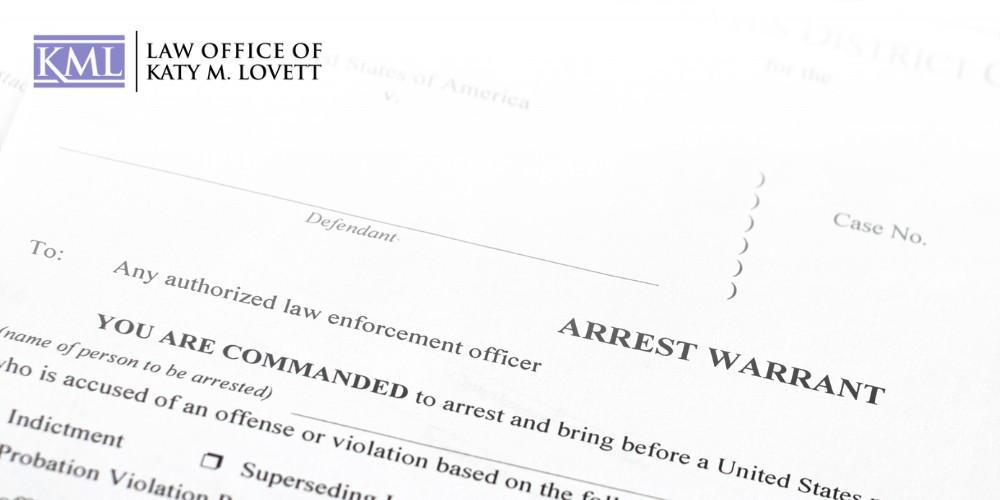Falling behind in court-ordered child support payments can have serious consequences in Texas. Many parents wonder, “How far behind in child support before a warrant is issued in Texas?” The truth is that Texas law aggressively enforces child support obligations to protect the well-being of children. If a non-paying parent continues to miss payments, enforcement actions can escalate.
From wage garnishment and license suspension to arrest warrants and even jail time, the child support enforcement agency and Texas courts take unpaid child support seriously. If you owe child support, the state may collect past due payments from your bank accounts, non-paying parent’s wages, or even seize tax refunds and lottery winnings to satisfy your child support debt.
Whether you need help modifying a child support order, negotiating a repayment plan, or defending against wage garnishment, license suspension, or an arrest warrant, the Law Office of Katy M. Lovett, PLLC, can help. Call (512) 956-5356 or complete our online intake form to schedule a consultation with Round Rock child support attorney Katy M. Lovett today.
Understanding Child Support Obligations in Texas
In Texas, parents are legally required to provide financial support for their children, even if they are no longer in a relationship with the other parent. Texas Family Code, Section 154, establishes the guidelines for child support obligations, ensuring that the custodial parent receives financial assistance for essential expenses such as housing, food, medical care, and education.
Once a child support order is issued, the non-custodial parent must pay child support regularly and in full. Failing to do so can lead to serious consequences, including wage garnishment, license suspension, and even an arrest warrant. The longer past-due child support goes unpaid, the more aggressive enforcement efforts become.
What Happens If You Fall Behind on Child Support Payments in Texas?

When a non-paying parent falls behind on child support payments in Texas, the child support enforcement agency can take aggressive action to collect past due child support. Unpaid child support payments are considered child support debt, and Texas law allows the Attorney General to enforce court-ordered child support through various legal methods.
Missing a child support payment can result in wage garnishment, bank account seizures, license suspension, and negative reports to credit bureaus. As delinquent child support increases, enforcement efforts become more severe.
If a parent fails to pay for an extended period, they may face an arrest warrant and even jail time. The longer outstanding child support payments go unpaid, the more serious consequences a delinquent parent may face.
How Many Payments Can You Miss Before a Warrant Is Issued?
Many parents ask, “How far behind in child support before a warrant is issued in Texas?” Texas law does not specify an exact number of missed payments that will automatically result in an arrest warrant, but enforcement actions start once a non-paying parent accumulates past due child support.
The child support enforcement agency and the Texas Attorney General closely monitor unpaid child support payments, and as the child support debt increases, enforcement measures become more severe.
Texas actively pursues child support evaders, using penalties such as wage garnishment, bank account seizures, license suspension, and passport revocation. If a delinquent parent repeatedly fails to comply with a court-ordered child support agreement, Texas courts may issue a capias warrant, allowing law enforcement to make an arrest.
Child Support Enforcement Actions in Texas

When a non-paying parent falls behind on child support payments, Texas has multiple enforcement tools to collect past-due child support. The child support enforcement agency and the Texas Attorney General take unpaid obligations seriously and use various legal actions to recover outstanding child support payments.
Understanding child support enforcement in Round Rock is crucial for parents who owe child support in Texas and those seeking assistance collecting child support. The following sections explain the different penalties and legal consequences for non-paying parents in Texas.
Wage Garnishment and Income Withholding
One of Texas’s most common enforcement actions for unpaid child support is wage garnishment and income withholding. Under Texas law, the child support enforcement agency can issue a wage garnishment order requiring the non-custodial parent’s employer to deduct child support payments directly from their paycheck. This method helps ensure compliance with court-ordered child support and prevents further child support debt from accumulating.
Employers are legally required to follow the income withholding order, and failure to do so can result in penalties. In addition to regular wages, non-paying parents may also have child support deducted from tax refunds, lottery winnings, and even workers’ compensation benefits.
Driver’s License and Professional License Suspension
Texas law allows the child support enforcement agency to suspend a non-paying parent’s driver’s license and professional license if they fall behind in child support. This enforcement action is designed to pressure Texas child support evaders into making child support payments and fulfilling their child support obligations.
A delinquent parent who fails to pay court-ordered child support may be unable to drive, affecting their ability to work and handle daily responsibilities. In addition, professional licenses, including those for doctors, lawyers, contractors, and other skilled professionals, can also be revoked due to unpaid child support payments.
To reinstate a suspended license, the non-paying parent must either pay past-due child support or establish a repayment plan. If your driver’s license or professional license is at risk of suspension due to outstanding child support payments, seeking legal representation from knowledgeable child support lawyers can help you explore options to avoid further penalties.
Passport Revocation for Unpaid Child Support in Texas
International travel can also be restricted through passport revocation for parents behind in child support. Under federal and Texas law, the child support enforcement agency works with the U.S. State Department to deny or revoke passports for non-paying parents who owe more than $2,500 in unpaid child support payments. This means a delinquent parent cannot renew or apply for a passport until their child support debt is resolved.
This enforcement action can create significant obstacles for parents who frequently travel for work or personal reasons. To restore passport eligibility, the non-paying parent must make arrangements with the child support enforcement agency to pay past-due child support.
If your ability to travel has been affected due to outstanding child support payments, seeking legal assistance can help you explore options to regain compliance and avoid further enforcement actions.
Liens on Property and Bank Account Seizures
Texas law allows the child support enforcement agency to place liens on property and seize funds from bank accounts when a non-paying parent has outstanding child support payments. This enforcement action targets child support evaders who have accumulated delinquent child support by securing unpaid amounts against real estate, vehicles, and other valuable assets.
Additionally, the state can freeze and seize money from a non-paying parent’s bank accounts, including savings, checking, and investment accounts, to recover past-due child support.
In some cases, Texas may also intercept tax refunds and lottery winnings to satisfy child support debt. A lien on the property can prevent the non-custodial parent from selling or refinancing assets until the unpaid child support payments are resolved.
Contempt of Court and Arrest Warrants
When a non-paying parent repeatedly fails to pay child support, Texas courts may find them in contempt of court. This can lead to severe penalties, including fines, court-ordered repayment plans, and even an arrest warrant. Child support evaders who ignore court-ordered child support can be subject to civil or criminal contempt charges, depending on the circumstances.
If a parent is found in civil contempt, they may be ordered to make partial payments or fulfill other conditions to avoid jail time. However, in cases where a non-paying parent deliberately refuses to meet their child support obligations, they may face criminal nonsupport charges under the Texas Penal Code, which can result in more serious consequences, including imprisonment.
Texas law allows judges to issue capias warrants, authorizing law enforcement to arrest a delinquent parent for failing to comply with a child support order.
When Does Texas Issue a Warrant for Child Support Arrears?
Texas courts may issue an arrest warrant for child support arrears when a non-paying parent repeatedly fails to pay child support despite multiple enforcement efforts. The decision to issue a warrant depends on several factors, including the total amount of unpaid child support payments, how long the parent has been behind in child support, and whether the parent has made any partial payments.
The child support enforcement agency and the Texas Attorney General monitor delinquent child support cases. When a non-paying parent refuses to comply with a court-ordered child support agreement, judges may issue a capias warrant, allowing law enforcement to make an arrest. In cases where a parent intentionally avoids their child support obligations, they may also face criminal nonsupport charges under the Texas Penal Code.
If you owe past due child support and are at risk of an arrest warrant, it is important to seek legal representation immediately to explore options for repayment and prevent more serious consequences.
Can You Go to Jail for Not Paying Child Support in Texas?

Yes, a non-paying parent can face jail time for failing to pay child support payments in Texas. Child support in Texas is a legally binding obligation, and when a non-custodial parent refuses to comply with a court-ordered child support agreement, they can be held in contempt of court. This can result in serious consequences, including fines, court-ordered repayment plans, and even an arrest warrant.
The custodial parent relies on these payments for the child’s well-being, and Texas law enforces strict measures to ensure compliance. In extreme cases, a delinquent parent may be charged with criminal nonsupport under the Texas Penal Code, which applies when a parent has the ability to pay child support but willfully refuses. A conviction can lead to up to six months in jail.
If you are struggling with child support in Texas and at risk of facing legal consequences, seeking legal representation can help you avoid more serious consequences and explore repayment options before enforcement actions escalate.
How to Request a Child Support Order Modification in Round Rock
If a non-custodial parent or custodial parent experiences a substantial change in circumstances, they may be able to request a child support order modification in Round Rock. Child support in Texas is calculated based on income, number of children, and other financial factors, but when a parent faces job loss, medical issues, or other significant financial hardships, they may struggle to pay child support payments as originally ordered.
To request a modification, a parent must file a petition with the Texas courts or submit a request through the child support enforcement agency. The court will review whether the change in financial status justifies adjusting the child support obligations.
It is important to continue making partial payments while the modification request is pending. Failure to do so can result in delinquent child support and potential enforcement actions such as wage garnishment, license suspension, or even an arrest warrant.
Struggling with Child Support in Texas? Contact Our Round Rock Child Support Attorney Today

Texas law takes child support obligations seriously, and failing to pay child support payments can lead to serious consequences, including wage garnishment, license suspension, and even an arrest warrant.
Whether you’re a custodial parent struggling to receive child support payments or a non-paying parent facing enforcement actions, the Law Office of Katy M. Lovett, PLLC is here to provide the legal guidance you need to protect your rights and resolve your child support case.
To learn more about how our Round Rock child support attorney can help, call (512) 956-5356 to schedule a consultation today.


